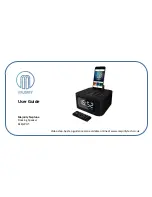
12
Making the Point 2 Connections
As with any system, you should make changes to the connections only when
the power is turned off to avoid any chance of inadvertently causing a problem
(such as a short-circuit).
Passive (Single-amped)
As shipped from the factory, the Point 2 is ready to be used with a single am-
plifier channel driving the entire speaker. However, you will note that there
are two sets of binding posts in the connection area on the front bottom right
corner of the speaker:
Please use the “Low Pass” connectors closer to the edge of the speaker when
using the internal passive crossover and a single amplifier channel to drive the
Point 2. Leave the other “High Pass” connectors alone and unconnected. If you
connect to the wrong terminals, you will get no sound from the speaker.
Active (Biamped)
For even greater performance, you can use the Sage Cinema Point 2 in a biam-
plified mode that completely bypasses the internal passive crossover. In order
to do so, your installer will remove the woofer from the loudspeaker cabinet,
which provides access to the internal, passive crossover. There are two keyed
Molex™ connectors on the crossover circuit board. Simply remove the input
and output connectors from the board and snap them together. This action
completely bypasses the passive crossover and provides a direct connection
from the amplifiers to their respective drivers.
When using an external active crossover like the Wisdom Audio SC-1, two sets
of speaker wires are required for each Sage Cinema Point 2 loudspeaker: one
pair for the woofer (low pass) section, and a separate pair for the planar mag-
netic (high pass) section that handles the midrange and treble.
We recommend using heavy-gauge speaker wire, particularly when the instal-
lation forces you to use longer wires than you might otherwise. A good rule of
thumb is to keep the “loop resistance” below 0.07 ohms.
There are many online wire gauge calculators and tables, such as
http://www.powerstream.com/Wire_Size.htm
For example, using this table you can estimate that 50 feet of AWG 8 speaker
wire (and thus 100 feet of “loop” would have a loop resistance of about 0.063Ω,
which would be fine.






































